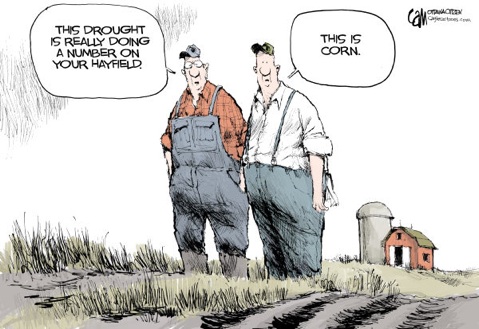Drought Turns a Light on Farming Methods
Healthy Land Practices Can Control Damage and Help Recovery

The extended drought in California, considered the worst in over a thousand years, should be considered a final alarm bell for current growing methods. Because what we’re seeing now is a dismal foretaste of the future. Parched landscapes. Dead almond trees. Rationed water.
Agriculture is the heaviest user of water in California — about 80 percent, according to some estimates — only because it still adheres to the industrial model of food production that requires lots of fertilizer, diverted water, and single crops spread monotonously across vast acreage.
But there are high prices to pay for this approach, not only in terms of depleted groundwater but also polluted “dead waters” from fertilizer runoff, health impacts among migrant workers from pesticide applications, and rising obesity rates from a food system that encourages overproduction of corn and soy, and unhealthy food products.
It gets even worse: Our current methods of growing food are responsible for about one-third of global greenhouse gas emissions, according to the Consultative Group on International Agricultural Research. At the same time, increased global temperatures are expected to have dramatic impacts on our current abilities to produce food. In some areas scientists predict food production could be reduced to half the current levels.
Isn’t it time that we consider farming differently? Just as in the time of the Dust Bowl of the 1930s, we need to take dramatic action if we are going to address this emergency adequately. But unlike the top-down FDR approach, what we need is a grassroots embrace of the new “agroecological” methods that mimic nature, go easy on the water, and emit far fewer greenhouse gases.
In Chicago and Milwaukee, for example, the Growing Power program uses earthworms to eat food scraps, fish to eat the worms, and a recycling water system, all of which produce organic produce sold in poor neighborhoods. Urban youth get training on how to grow food in this innovative and ecological fashion, while also building entrepreneurial and leadership skills.
Just outside my little town in New York State, a multitude of organic, diversified farms combine livestock, trees, and produce to grow a significant amount of fruits, vegetables, grain, and meat for thriving local farmers markets, food banks, a grain mill, even beer production.
Far away in Malawi, the Soils, Food and Healthy Communities project (with which I’ve had the privilege of collaborating) has taught agroecological methods in hundreds of Malawian villages over the last 15 years, and the results have been impressive. Farmers started planting soil-repairing crops such as peanuts and pigeonpea, which provide a food source as well as other benefits such as a source of cash, livestock feed and even fuel.
A wealth of homegrown expertise can be found right here in California, including the Center for Agroecology and Food Systems at the University of California, Santa Cruz, which has extensive partnerships with farmers, community groups, schools, and even a farm-to-college arrangement so that college students are able to access agroecologically produced food and learn how to grow it. At UC Berkeley, the Berkeley Food Institute’s Center for Diversified Farming Systems Research has provided strong evidence that this approach to farming ensures healthy land quality and food production can go hand in hand.
These methods protect farms against the kind of crushing drought California is now suffering. One study from Columbia University examined the impacts of different farming practices on the response to hurricanes and droughts in Mexico, Tanzania, Sweden, and Cuba, all of which found that agroecological methods helped farms withstand damage and recover faster.
The old “beef and tomato” recipe of California farming is no longer sustainable, and the long, hot summer ahead is going to make that even more plain. The farmers of the Dust Bowl learned the lessons of soil conservation only after their farms nearly disappeared. We need to invest now in agroecological methods and learn from our giant mistakes, just as they did.
Rachel Bezner Kerr is a professor of Development Sociology at Cornell University.



